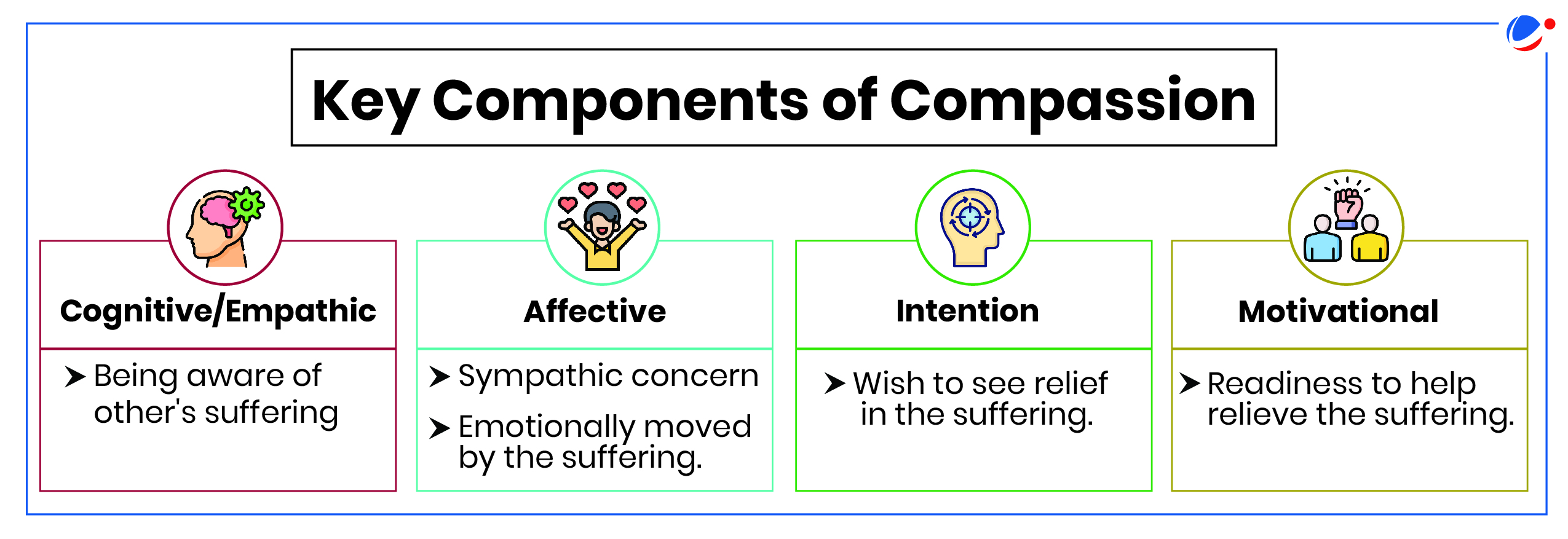Introduction
Recently, former United Nations Secretary-General, Ban-Ki-Moon, highlighted the significance of Mahatma Gandhi's compassion. He held that Mahatma Gandhi embodied and lived the principles of UN Charter much before it was founded and has inspired global leaders like Nelson Mandela, Martin Luther King Jr, etc. Undoubtedly all core values of Mahatma Gandhi like nonviolence, truth, peace, justice and inclusion are rooted and are the concrete external manifestations of compassion.
What is Compassion?
- It is the feeling that arises due to the suffering of others, coupled with the desire to alleviate that suffering. It is different from sympathy and empathy as
- Sympathy is a feeling of pity or sorrow for someone else's suffering, empathy is the ability to feel what another person is feeling, and compassion is the combination of both sympathy and empathy with a desire to alleviate suffering.
- It's a universal ethic transcending cultural, religious, and ideological boundaries.

What are the key values of Mahatma Gandhi that foster Compassion?
- Satyagraha: It is the method to secure one's rights without inflicting injury on others.
- Gandhi's Satyagraha (1917) was driven out of Compassion after witnessing the ruthless exploitation of indigo farmers by the British landlords.
- Equality: Treating untouchability as a curse, his compassion towards the people who were discriminated against made him fight for it.
- He also championed the cause of women's empowerment and called Woman as the embodiment of sacrifice and ahimsa
- Respect for Humanity: Gandhi had compassion even towards the oppressor and never hated the British people.
- Kindness: He was a committed vegetarian and discouraged the slaughter of animals on moral grounds.
- He held that "If anybody said that I should die if I don't take beef tea or mutton, even on medical advice, I would prefer death."
- Sarvodaya (Welfare for all): He saw God in every individual and held that one could reach god through the service of humanity.
- Non-Violence: It was a tool to attain the ultimate end i.e., Truth. His concept of non-violence was a positive one that propagated love for selfless action as opposed to the idea of non-injury or non-killing.
- He held truth as a sovereign principle to be attained not only in words but in thought as well.
- Concern for Nature: He spoke against the evils of large-scale urbanisation and called for the conservation of nature and biodiversity.
- According to him, "The Earth has enough resources for our needs but not for our greed."
- Altruism or Self-Sacrifice: Gandhi's Talisman is an example of his altruism and compassion for others.
- "Whenever you are in doubt, or when the self becomes too much, recall the face of the poorest and the weakest man you may have seen, and ask yourself, if the step you contemplate is going to be of any use to him"
- Concept of trusteeship: According to Gandhi the landowner, rich men have to act as trustees of what they own, i.e. they have dedicated the rights to their property and material goods to the common people.
Seven Deadly social sins identified by Mahatma Gandhi
|
Contemporary relevance of Mahatma Gandhi's Compassion
- Addressing climate crisis: Gandhi's philosophy of living in harmony with nature is especially relevant in addressing the climate crisis.
- Resolving contemporary conflict: His approach of "hate the sin, not the sinner" provides a framework for engaging with those we disagree with while maintaining human dignity
- Dealing with economic crisis: Gandhi's idea of true economics deals with social justice promoting good of all equally.
- His focus on self-sufficiency, decentralised mode of production; idea of trusteeship, aim to promote a just and inclusive economic system.
- Force for Social Change: Ideas of Mahatma Gandhi are gaining traction in the form of initiatives like the Swachch Bharat Mission, inspiring movements for social change.
- Dealing with Fragmentation in Society: His vision of inclusive spirituality that respects all faiths offers guidance for interfaith dialogue.

Way forward on imbibing compassion
- Imbibing compassion from the stage of Childhood: Providing assistance and encouragement would help children foster a sense of connection towards others helping them become compassionate future leaders.
- Fostering Social Responsibility: This involves understanding the challenges faced by the social sectors and taking up initiatives to reform them.
- Practising Self-Compassion: To be able to understand the sufferings and emotions of others, one needs to first reflect over own sufferings and emotions.
- Accepting mistakes and failures: Focus on being patient and showing forgiveness (for others and yourself) for mistakes.
Conclusion
Mahatma Gandhi's values remain highly effective as catalysts for change, equipping a generation of informed and empowered citizens to forge a future marked by compassion, equality and progress. His beliefs continue to enlighten India as well as the entire world in dealing with the current challenges.
Check your ethical aptitudeYou have been recently selected to the post of Block Development Officer through a merit based competitive exam. For the purpose of your studies, you had moved to a metropolitan city away from your native village. Post the announcement of result, you decide to visit your village after almost 5 years. On reaching there, you met your paternal aunt, widowed a year back. You observed the discriminatory treatment subjected to her as not being involved in the family celebrations, prohibition on entering into kitchen and main areas of the house, etc. Disturbed by this, you decided to confront your parents who informed you that villagers there look at widowed women as bad luck and maintain their distance. Presence of such beliefs in the 21st century in your village and own household has disturbed you. Based on the above case study, answer the following questions:
|





